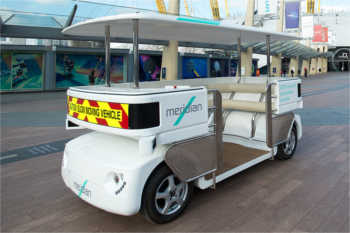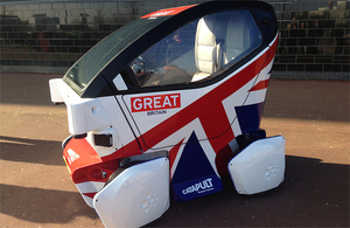Prototype driverless cars that will be tested in four English cities were unveiled today, with ministers suggesting the £19m government seed funding for the schemes could help develop a £900bn industry by 2025.
The news follows a major review by the Department for Transport (DfT) into the legal and regulatory issues around autonomous vehicles, which gave the trials a green light.
It found that ‘real-world testing of automated technologies is possible in the UK today, providing a test driver is present and takes responsibility for the safe operation of the vehicle; and that the vehicle can be used compatibly with road traffic law’.
Business secretary Vince Cable said: ‘The projects we are now funding in Greenwich, Bristol, Milton Keynes and Coventry will help to ensure we are world-leaders in this field and able to benefit from what is expected to be a £900bn industry by 2025.
‘The government’s industrial strategy is backing the automotive sector as it goes from strength to strength, we are giving business the confidence to invest over the long term and developing cutting-edge technology that will create high skilled jobs.’
The first trials got underway today on the Greenwich Peninsula beside the O2 Arena using the self-driving Meridian shuttle developed by Phoenix Wings. Over the next two years the Greenwich Automated Transport Environment (GATEway) project will test the automated transport systems in a range of environments as well as explore the legal and technical changes required to introduce automated vehicles and the reactions of other road users and pedestrians.

The Meridian shuttle
Cllr Denise Hyland, leader of the Royal Borough of Greenwich said: ‘We’re proud here in Greenwich to be at the forefront of developing this technology. We offer the ideal setting for these trials; an expanding population, a complex urban environment and a variety of existing and expanding transport links – which will really tell us what we need to know about putting driverless vehicles into an urban setting.’
An electric two-seater ‘LUTZ’ Pathfinder pod made by Coventry engineering firm RDM and using sensory apparatus linked up to a Macbook Pro will also be unveiled for trials in Milton Keynes and Coventry.
The Transport Systems Catapult today, the UK’s innovation centre for intelligent transport systems, will take a lead on the Pathfinder programme. Steve Yianni, chief executive of the Transport Systems Catapult said: ‘Through the LUTZ Pathfinder programme, the Transport Systems Catapult has pioneered the introduction of driverless pods in Milton Keynes and the first ever tests in the UK will take place in 2015 in a controlled public environment. The UK is at the forefront of this emerging new technology and could become the leading supplier of autonomous vehicles and systems around the world.’

The LUTZ pod
A third autonomous vehicle, the Wildcat, developed by BAE systems, will be tested in Bristol.
Bristol mayor George Ferguson told Transport Network he was very excited about the trails and maintained the city was a key testing areas because ‘if driverless cars can work in Bristol they can work anywhere’
Ministers also announced today that a full code of practice is due this spring for those wishing to test driverless vehicles on UK roads.
The DfT review has said that under current regulations ‘those wishing to conduct tests in the UK are not limited to the test track or certain geographical areas, do not need to obtain certificates or permits, and are not required to provide a surety bond (provided they have insurance arranged)’.
Transport minister Claire Perry said: ‘I believe we have one of the most welcoming regulatory environments for development of this technology anywhere in the world.’
However the departmental review added that while the term “driverless” is used to describe these technologies, the reality is that entirely removing the need for a driver is a longer-term goal for most vehicle types.